#violence in prison
Text
"When the average prisoner has an argument or fight with another inmate, he generally feels called upon to be as vindictive as possible, considering it a sign of weakness and effeminacy to shake hands afterwards and make up the peace with his enemy. He will rarely let the matter drop but will try to arouse the enmity of all his friends against his latest antagonist. To do this, he will tell a highly prejudiced story of the events which led to the quarrel and claim that everything his enemy says in rebuttal is a lie; and generally attempt to make his enemy out a "rat" or a "lousy bastard", or anything which will result in his ostracism. There is very little good sportsmanship or sense of fair play, it being considered the essence of folly and weakness to give an enemy an even break. The idea is to win, to gain the advantage no matter how.
Although he professes to despise the informer, the average inmate who is not a gangster thinks it perfectly justifiable to inform against an enemy, especially a prison official. Or if a fellow convict has given information against him, he usually feels that he is then justified in doing likewise; the idea that two wrongs never make a right is too subtle for him.
The average prisoner dislikes the work of the prison; but he actually hates any work of a menial kind such as emptying the slop buckets. Many inmates prefer to go to the cooler for ten days of bread and water, rather than to perform work they consider beneath their dignity! The fact that it is work which must be done, and that some one must perform it, does not make any difference. The usual reaction is: "What, me empty buckets? I should say not! Who do they think I am? They'll never make me do any of that kind of crap!"
Many inmates who work in offices, or hold relatively important jobs within the prison, become afflicted with the "big shot" complex and consider themselves highly indispensable persons. They are frequently seen strutting about the yard, bragging to their fellows of their ability, their privileges, and their general importance in the scheme of things. "Why," they will be heard to say, "that so-and-so of a 'screw' would be absolutely helpless over there without me!" I have seen men on intramural jobs, especially when working in the deputy warden's office as runner, who had so exalted an opinion of their capabilities and importance that I doubt if they could ever accustom themselves to normal positions as relatively unimportant persons in the free world. This naturally has a tremendously bad effect upon their chances of re-adjustment when they leave prison. Men who have been minor heroes in the prison world because of prominence in musical, athletic, or other activities, often go the same way.
There was, I remember, a prisoner named Walthour who had a very important prison job. He was the deputy warden's clerk. The deputy warden depended greatly upon Walthour for information about men who applied for various jobs and special privileges; and thus Walthour came to wield a great deal of power. If he recommended a man for a job, the man invariably got it; and so Walthour became a prison "big shot." He could walk un-challenged anywhere within the walls and could obtain for a friend (or for a cash consideration) anything within reason which a prisoner might desire. The job and the power went to his head; he became perfectly insufferable, although he was clever enough not to let the deputy warden see to what extent he had been influenced by unaccustomed power.
When he was released, after five years of this power, no job he could obtain in the free world could satisfy him. In the free world he could be nothing better than a second-rate clerk. This did not please him nor was it unruffling to his inordinate conceit. He threw up one job after another because he could not bear to be an ordinary mortal again. He took to stealing, riding about in a flashy car, pretending to be the same "big shot" in the free world that he had been in prison. Skeptical policemen in the town soon began to keep their eyes on him, and within three months he was back in prison where he immediately began angling for another important position.
In Eastern prisons, with the sole exception of those in the State of New York, there is little of that solidarity among prisoners which under the conditions one might expect (and about which so much drivel has been written). In New York it is the gangsters who preserve the spirit of solidarity in the prisoner group. I think this will be found true of every prison in which there is a sizable group of gangsters (as in Joliet, Illinois; Jefferson City, Missouri; San Quentin, California, etc.). For the rest, the prisoners are, as far as my personal experience and observation go, a pretty shabby lot in that respect.
In Charlestown, for example, there is hardly a trace of class consciousness or esprit de corps. There are perhaps fifty or sixty inmates in the population of nine hundred who have any faintest notion of loyalty to their kind. I remember several very revealing events, in this connection. For example, a man was caught surreptitiously playing checkers in the brush shop. When haled before the deputy warden for a breach of shop rules, he said, "The men up in Shoe Four can play checkers when they get their work done; I don't see why I shouldn't be allowed to do the same down here in the brush shop." That this was sound reasoning is beside the point. The point is that he thought only of himself, of saving himself a few days in the "cooler" by revealing the fact that his fellows in another shop, under a more broadminded guard, were permitted a privilege which was denied him. He cared not that in so doing he would deprive fifty fellow prisoners of a petty privilege they had been lucky enough to obtain.
Another incident reveals this tendency even more sharply. Two men planned to make an escape. During a morning church service attended by only a few inmates (of the Episcopalian sect) and guarded by a single officer whom they planned to over-power, one man was to seize the guard's gun and hold the roomful of prisoners in check while the other man sawed out a steel window bar which would permit them to escape. Luckily for the guard, his gun was unloaded. As the men assaulted him, he cried out for help, and told every one that the gun was unloaded. One of the desperate men, had already secured the gun, held it against the guard's body, and pulled the trigger. When the gun failed to explode, several prisoners, instead of helping their fellows, as might have been expected, ran to the guard's rescue, and at length the two desperadoes were subdued.
The thing which I made note of at the time was that the men who jumped to the rescue of the guard were not men who had reformed and were sincerely interested in upholding law and order; they were two of the most notorious hypocrites in the place, men who "played" the religious and welfare workers for all there was in it, and were now aiding the prison authorities simply because they saw a chance of thus advancing their own selfish interests, possibly to the extent of winning paroles or even pardons. As it happened, however, one of the men was a lifer whose own father had objected to his getting a pardon; but the other man obtained a parole within a few months.
Even more illustrative of the lack of class loyalty is the steady stream of notes which pours daily into the warden's office of any prison. In these notes the prisoners "get even" with personal enemies by telling tales and generally stirring up envy, jealousy, and a vast amount of friction.
The average prisoner, despite all that he has seen of treachery and double-dealing, which ought to teach him that appearances are often deceitful, seems to have developed little charity. He is very quick to condemn a fellow prisoner at the slightest hint of scandal. A friend of mine, who happened to be very well connected with some crooked politicians, once went out before a grand jury to testify against a "fence" who had withheld a large sum of money after disposing of the proceeds of a jewel robbery. The idea was simply to force the "fence" to disgorge more money. It was plain extortion. Through a crooked district attorney the "fence" had been arrested and the plan was to have him indicted by the grand jury. There was no thought of actually bringing him to trial. He was simply to be scared so that he would contribute a sizable sum of money for the "no-prossing" of the indictment. But the prisoners, of course, did not know all this. All they knew was that Swain had testified against some one before the grand jury. At once he was ostracized by the inmates. That he had all his life been "right" counted for nothing; that the "fence" never came to prison, and never even came to trial, was also of no consequence; and that my friend asserted that it was "all in the bag" (this was as far as he could let the whole group into the secret) made no difference. To this day he is considered "wrong" by all but a few intimate friends who were on the "in" of the story.
It is currently believed by the average prisoner that all religious and welfare workers who come to the prison are moral and sexual degenerates of one kind or another. The reason for this is that occasionally a male worker has actually been a sex pervert and occasionally a female worker has proved to be a sex-starved old maid. Another reason for this belief is to be found in the activities of the workers themselves. It seems that they almost invariably select, as deserving prisoners to help, the most depraved inmates in the institution. This is not their fault; it is due simply to the fact that such men appeal so strenuously and shamelessly for help that the worker can hardly help but yield to their importunate cries. And since so many of these men get help, whereas so many decent men (who hesitate to apply for help) are left unaided, this leads to the belief that welfare workers deliberately select sex perverts as deserving cases. Moreover, the average prisoner, because of vanity and egotism, believes it far more manly to steal than to beg; and so the prisoner who needs help is afraid to apply for it lest he incur the scorn of the prison herd, who would say to him, "Losing your nerve, eh? One of these Salvation Army bums, huh?" In other words, it is considered a worse crime to accept legitimate charity than to steal.
The egocentricity of the average prisoner is revealed in the most startling as well as in the most amusing ways. It is apparent in his brash loudness of voice, his pushing forward of himself and his views at every opportunity. When he is in line, he will crowd and shove his fellows (unless they are bigger than he is); at the table he will reach impolitely across his neighbor's place and grab the biggest or best portions of whatever is in sight; at the table he is inconsiderate and coarse, belching, feeding noisily, and generally revealing the table manners of a healthy pig."
- Victor F. Nelson, Prison Days and Nights. Second edition. With an introduction by Abraham Myerson, M.D. Garden City: Garden City Publishing Co., 1936. p. 126-133
#words from the inside#prisoner autobiography#prison community#convict code#gangsters#prison days and nights#victor nelson#history of crime and punishment#professional criminals#violence in prison#reading 2024#snitches get stitches#prison rat#american prison system#prisoner unrest#research quote#prisoner resistance#prisoner solidarity#new york prisons#massachusetts state prison#life inside
0 notes
Text

Israel went to Jenin today, in the West Bank, and kidnapped this 7 year old girl from her family. They do these things often but we rarely catch them on film [@/Carl0s_Vela on X.]:
#feminist#social justice#free palestine#palestine#freepalastine🇵🇸#current events#settler violence#settler colonialism#settler terrorism#israel is evil#israel is an apartheid state#israel is a terrorist state#israel is a war criminal#west bank#free west bank#tw sa mention#palestinian prisoners#palestinian children#end the occupation#israeli prisons#jenin#free jenin
4K notes
·
View notes
Text
TW: Rape


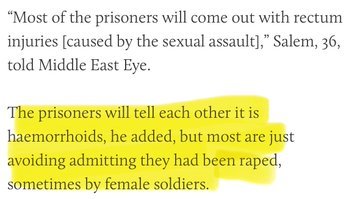
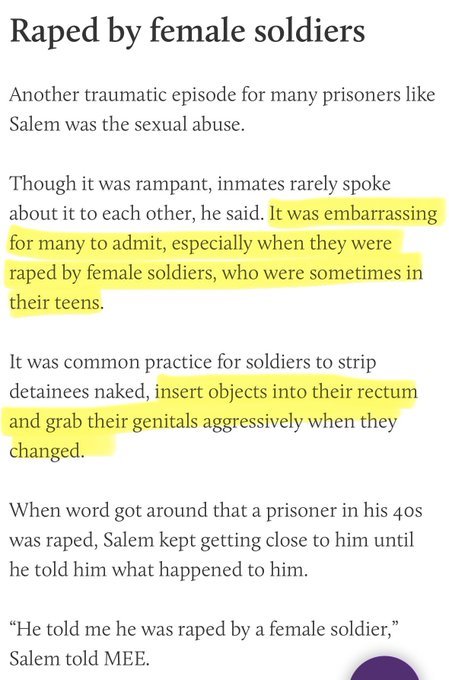
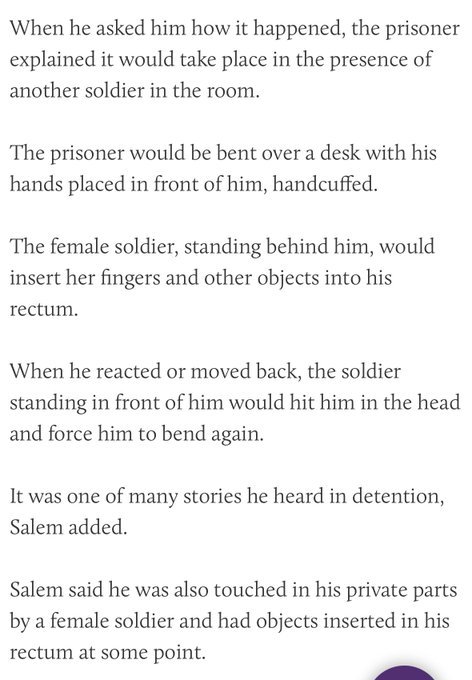
#yemen#jerusalem#tel aviv#current events#palestine#free palestine#gaza#free gaza#news on gaza#palestine news#news update#war news#war on gaza#palestinian hostages#palestinian prisoners#war crimes#fascism#settler violence#settler colonialism#rape tw#torture
1K notes
·
View notes
Text
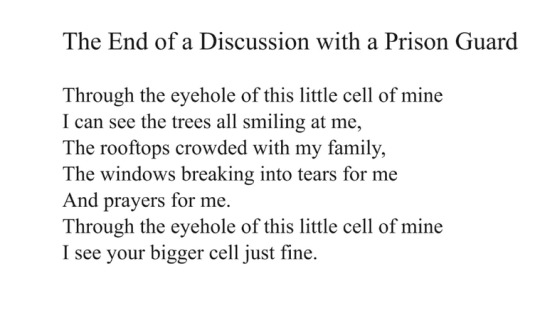
Samih al-Qassim, "The End of a Discussion with a Prison Guard" (trans. A.Z. Foreman, ID included), from A Map of Absence
#q#lit#quotes#poetry#typography#poems#samih al qassim#the end of a discussion with a prison guard#a map of absence#palestinian lit#m#x#of war and violence
2K notes
·
View notes
Text
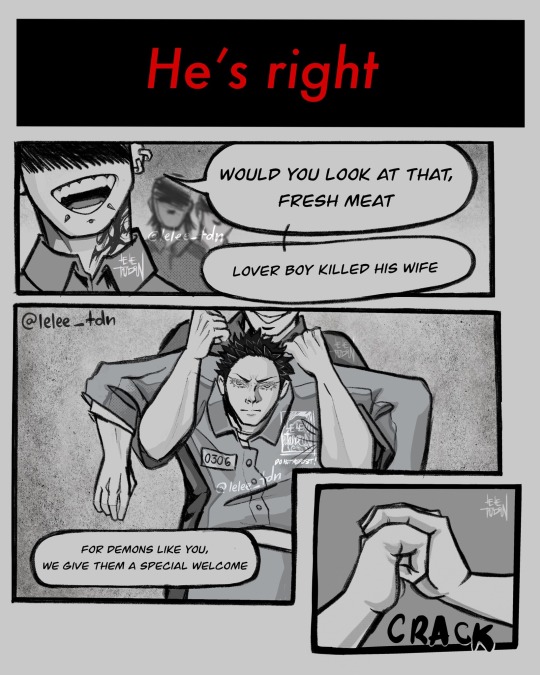
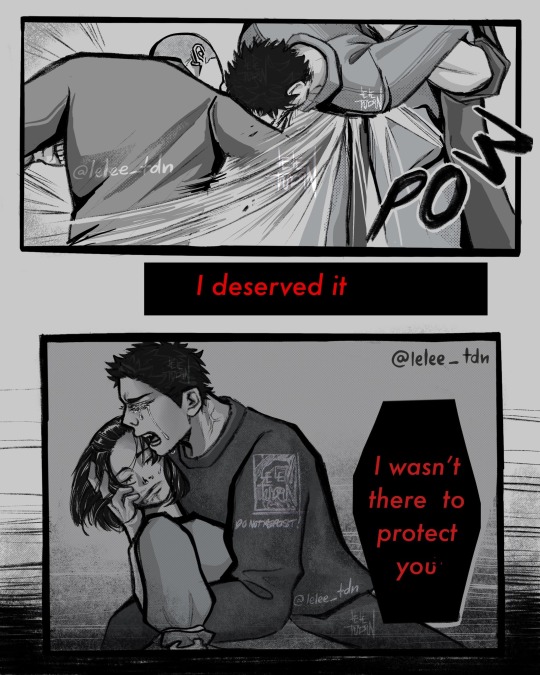
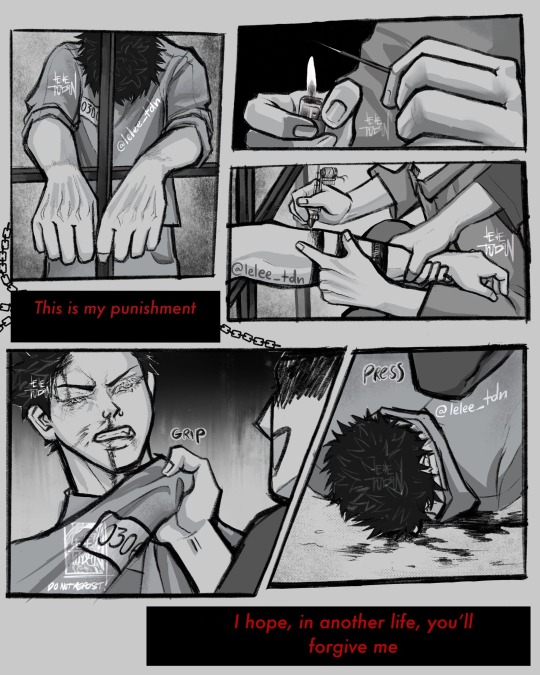
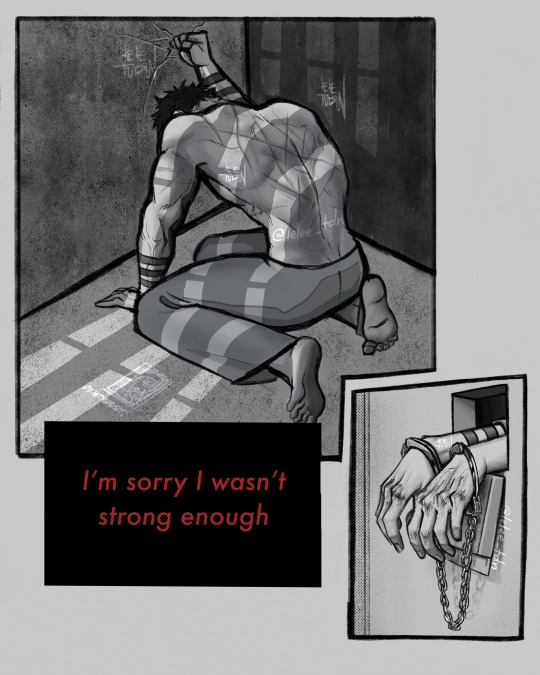

“Yet at the end of the day, it’s just a pathetic, comical, uninteresting story..”
Part 1 of the prison au: here :3c
#kny spoilers#tw: blood#implied spoilers#tw: violence#kny#demon slayer#kimetsu no yaiba#hakuji soyama#hakuji#hakukoyu#hakuji x koyuki#akaza kny#kny akaza#kny fanart#demon slayer fanart#anime fanart#drawing#comic#my art#artist on tumblr#akaza#akaza fanart#prison au#uppermoon 3
231 notes
·
View notes
Text
Rundown of the current protests, rioting and state crackdown that have erupted in France over the police murder of a 17 year old brown boy.
I've seen way too many Europeans on here insisting ACAB is just a USAmerican thing. It's really important y'all know that it isn't. Cops as an institution is fundamentally fascist, and in the Global North, white supremacist.

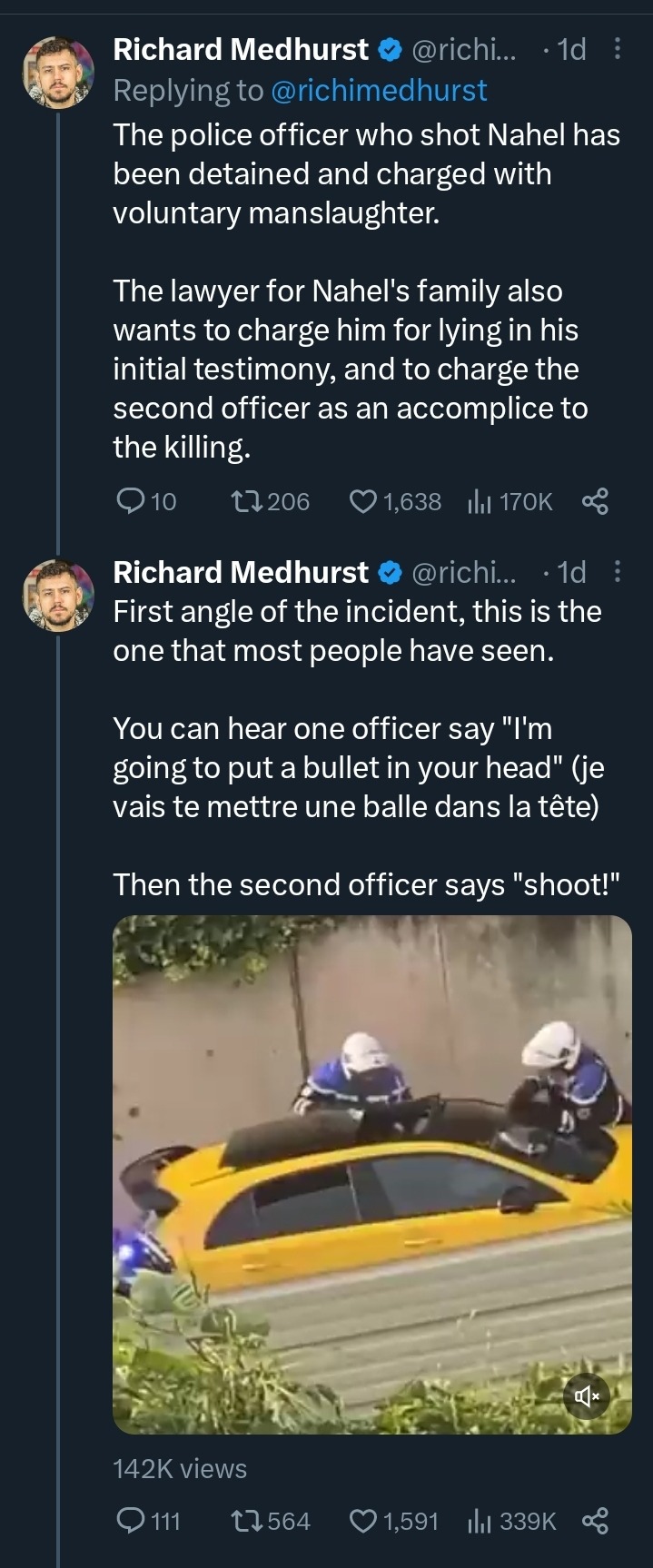
Link to video above
Link to video below


Link to video

Link to video 1
Link to video 2
Link to video below


Link to video 1
Link to video 2

Link to video

Link to video 1
Link to video 2
Link to video 3
Linked YouTube video:
youtube
Link to twitter thread

(alt text included for all images)
Rest in power baby boy.
*Correction: Nahel wasn't Black, but Maghrebi (of North African descent). Apologies for the mistake.
#ACAB#nahel#nahel m#police brutality#police killing#cw child murder#french politics#france#world news#current events#protests#french protests#colonization#racism#emmanuel macron#cw violence#algeria#algerian genocide#police abolition#prison abolition#twitter#knee of huss#Youtube
1K notes
·
View notes
Text
"but hamas is getting funded by extremist islamic hate groups!" do you think the U.S. government and military giving funding for israeli's war efforts against palestinians is a morally neutral and inherently righteous body that had no influence in the politics of southwest asia as a global colonial superpower. do you really think anything you can say about the people resisting oppression can't be said about the oppressors.
#brieuc.txt#palestine#this isnt me justifying it but it is me pointing out the double standard how hamas' funding is antithetical to the freedom movement#but the u.s.' influence and financial support is completely fine and doesnt need to be brought up at all#''hamas doesnt have the best interests of palestinian people'' may be true but the alternative is not allowing an apartheid state to exist#also its a ridiculous thing to say because thats a common thing in most countries#neo-nazi groups r a major problem in the Ukraine military but nobody questions ukraine's right for freedom.#the double standards keep on piling up#im not saying you cant criticise these groups but is it criticism or is it propaganda#are you talking abt how war radicalises and changes n traumatises people or are you implying every palestinian is a dirty terrorist#etc#and do you understand that in an active war zone n worlds largest open air prison violence is guaranteed and is brutal.#or do you think that if the people with no electricity and water just Werent So Stubborn And Talked everything would be okay?#and do you consider white people fighting for freedom martyrs but brown people doing the same terrorists
743 notes
·
View notes
Text
Jason: Look on the bright side. Nobody got hurt.
Tim: People got hurt.
Jason: I'm saying, I think they died quickly. So I don't think they got hurt.
#submitted by prison-mikes-bandana#source: the nice guys#jason todd#red hood#tim drake#red robin#batman#batfam#batfamily#incorrect batfamily quotes#batbros#batboys#batkids#batsiblings#batman family#incorrect quotes#incorrect dc quotes#dc comics#tw violence mention#submission
644 notes
·
View notes
Text
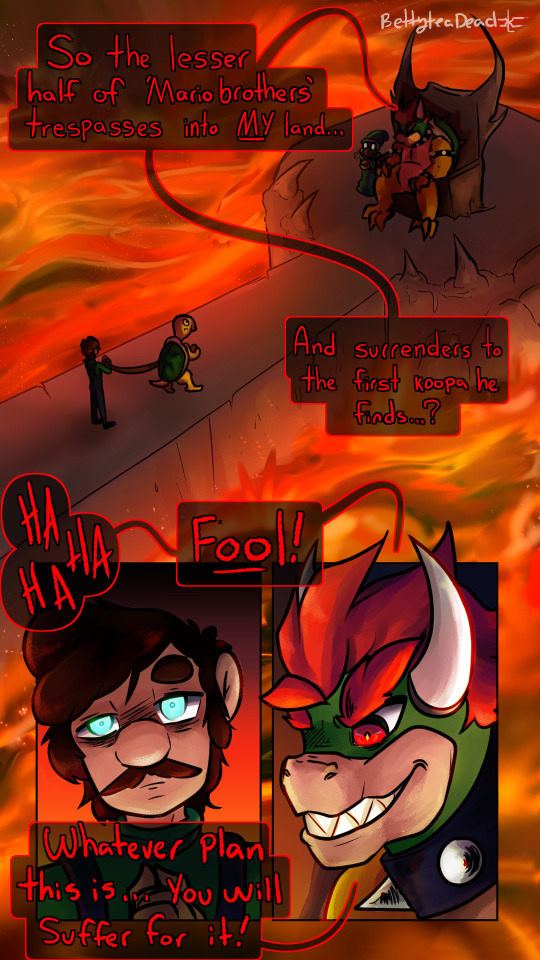
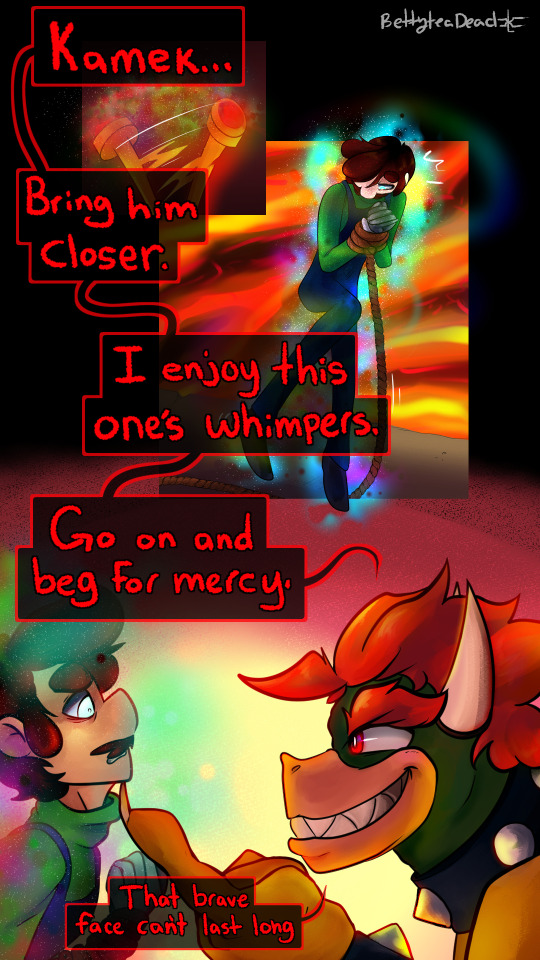

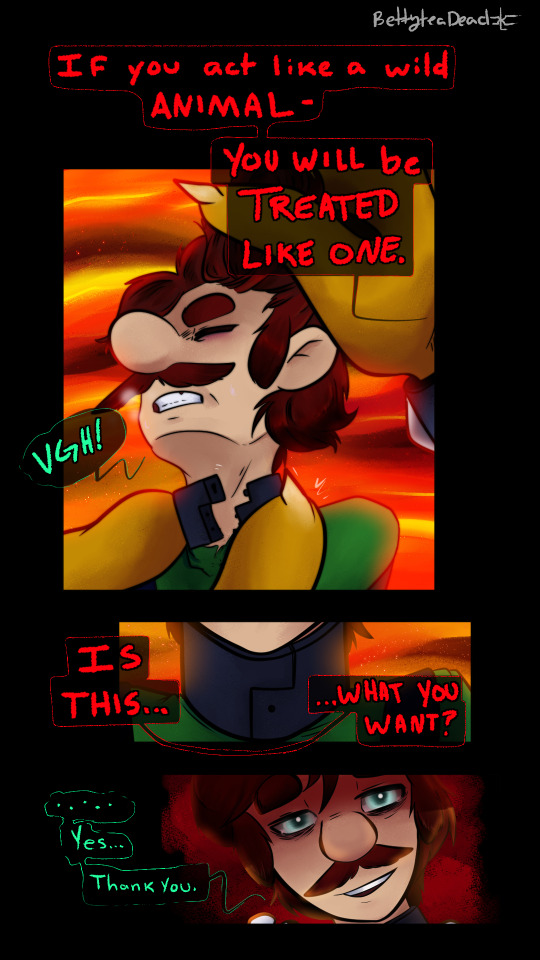
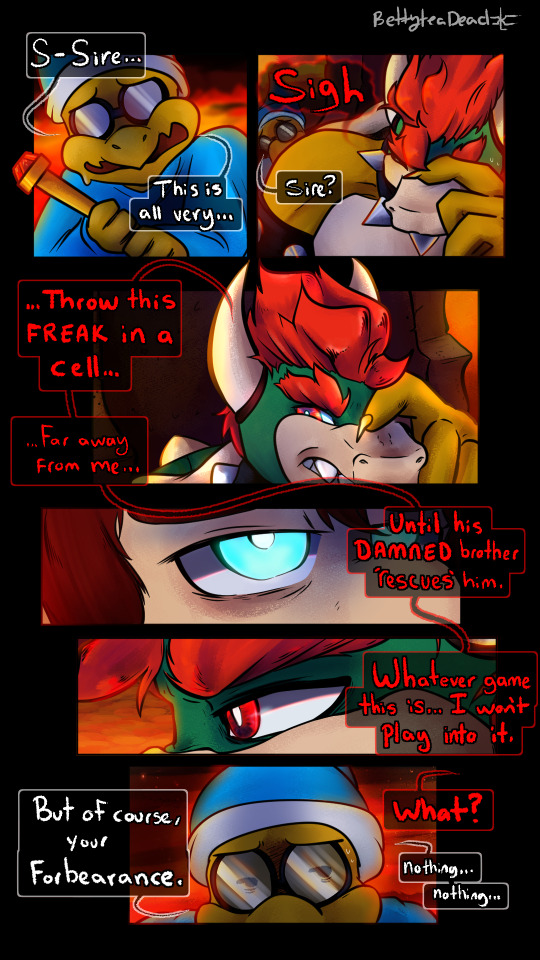
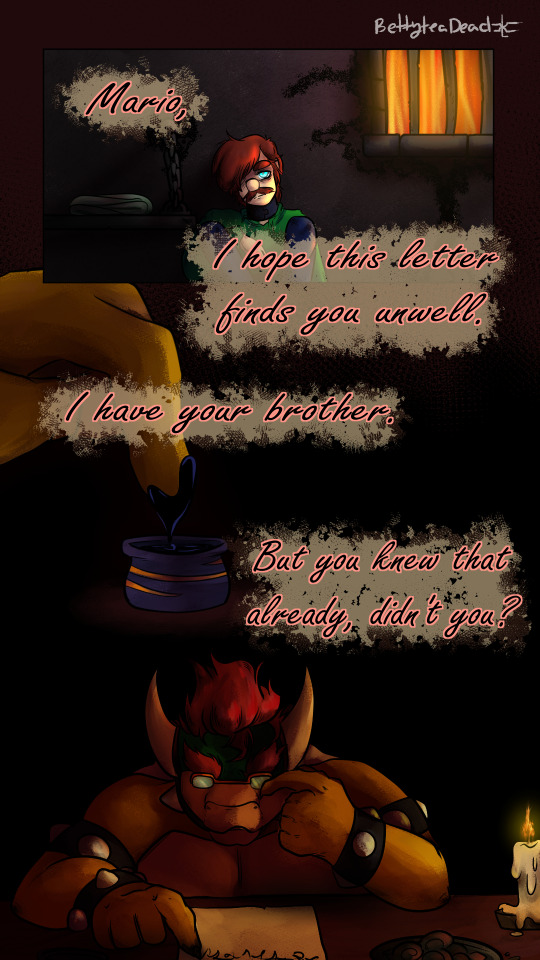
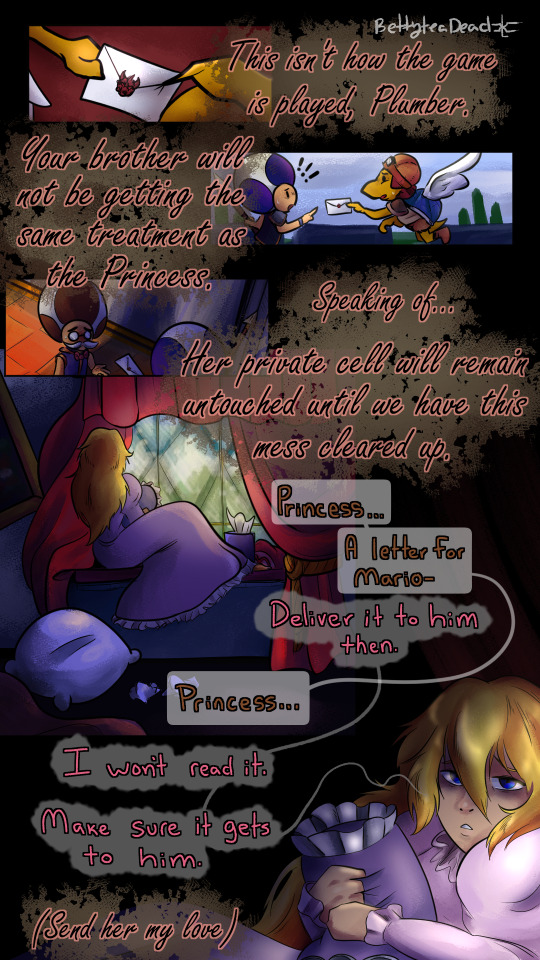
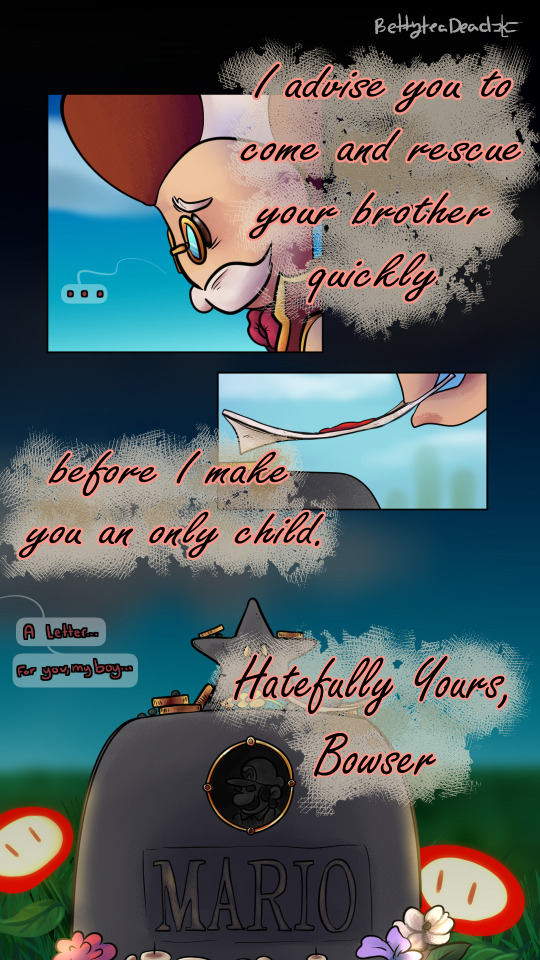
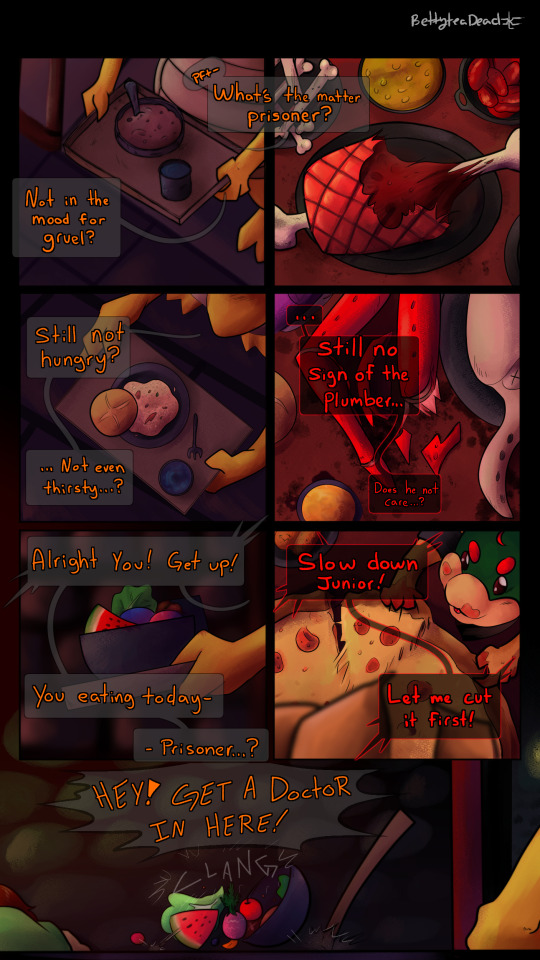
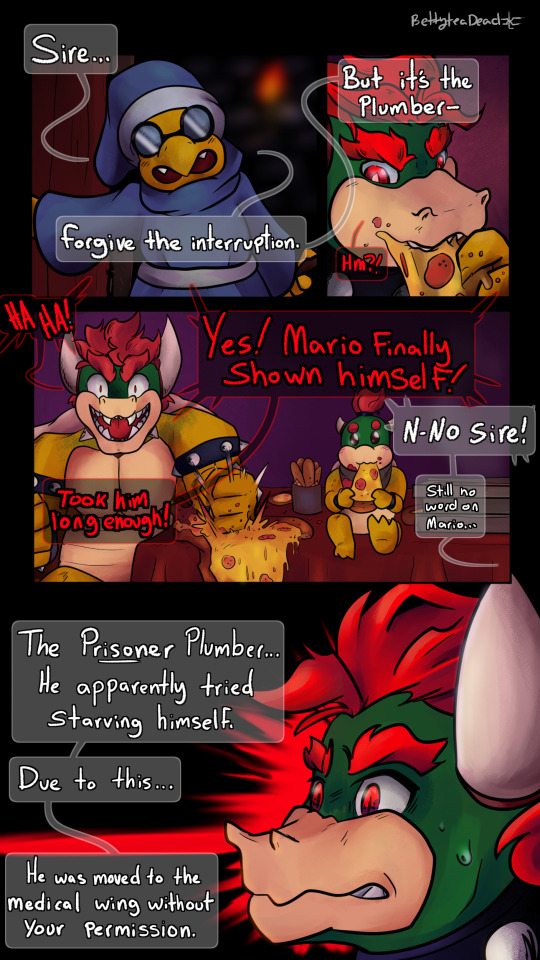
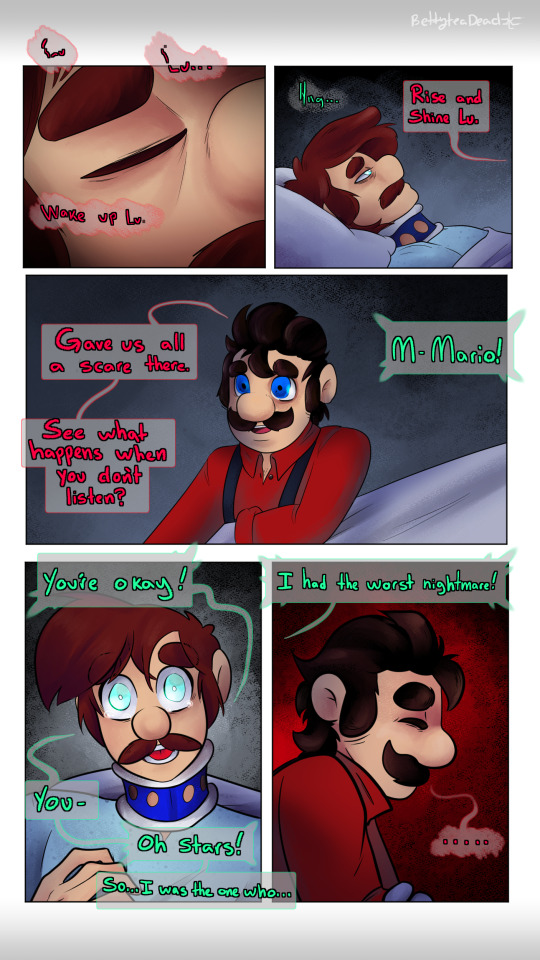
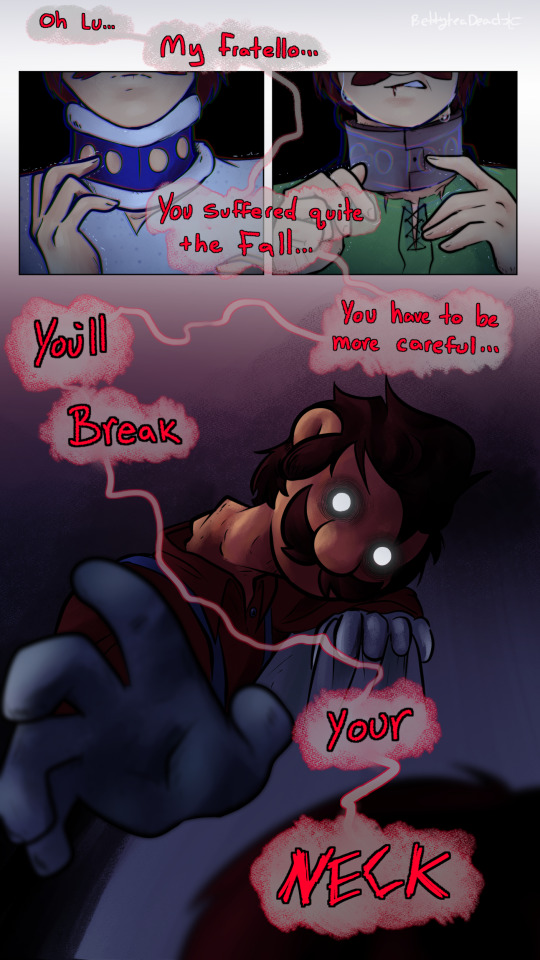
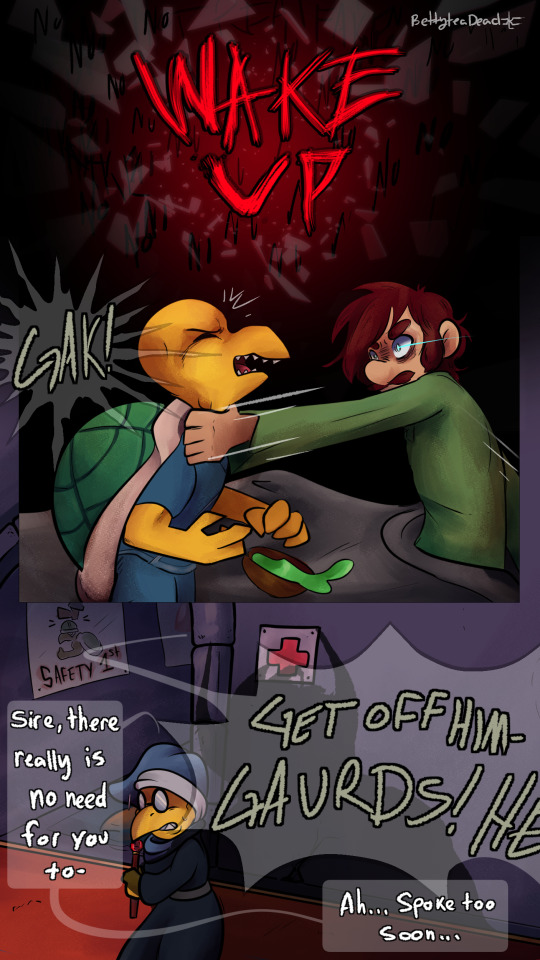
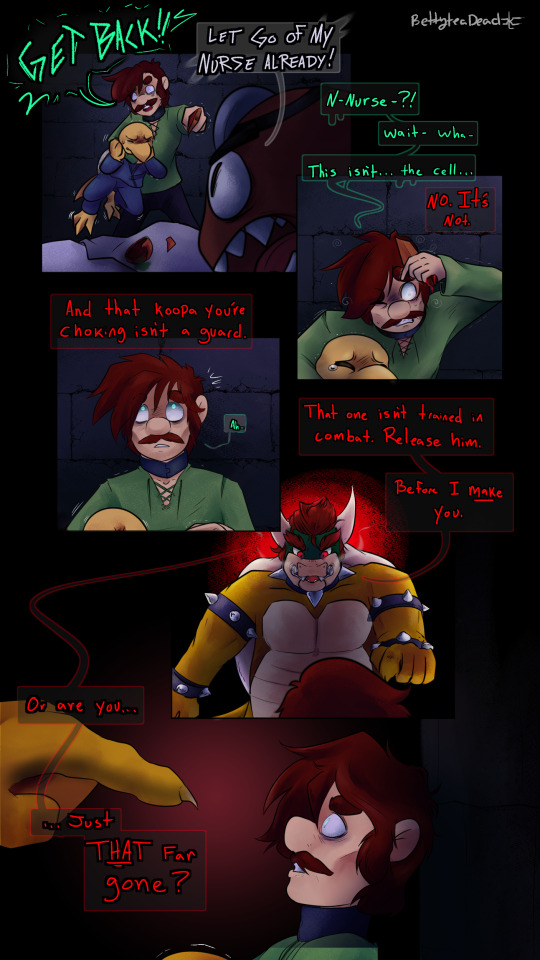
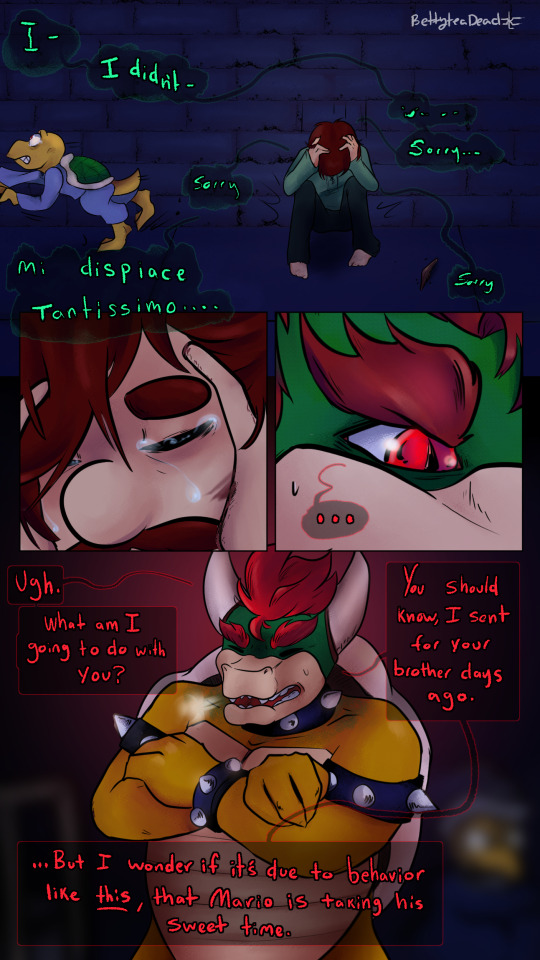



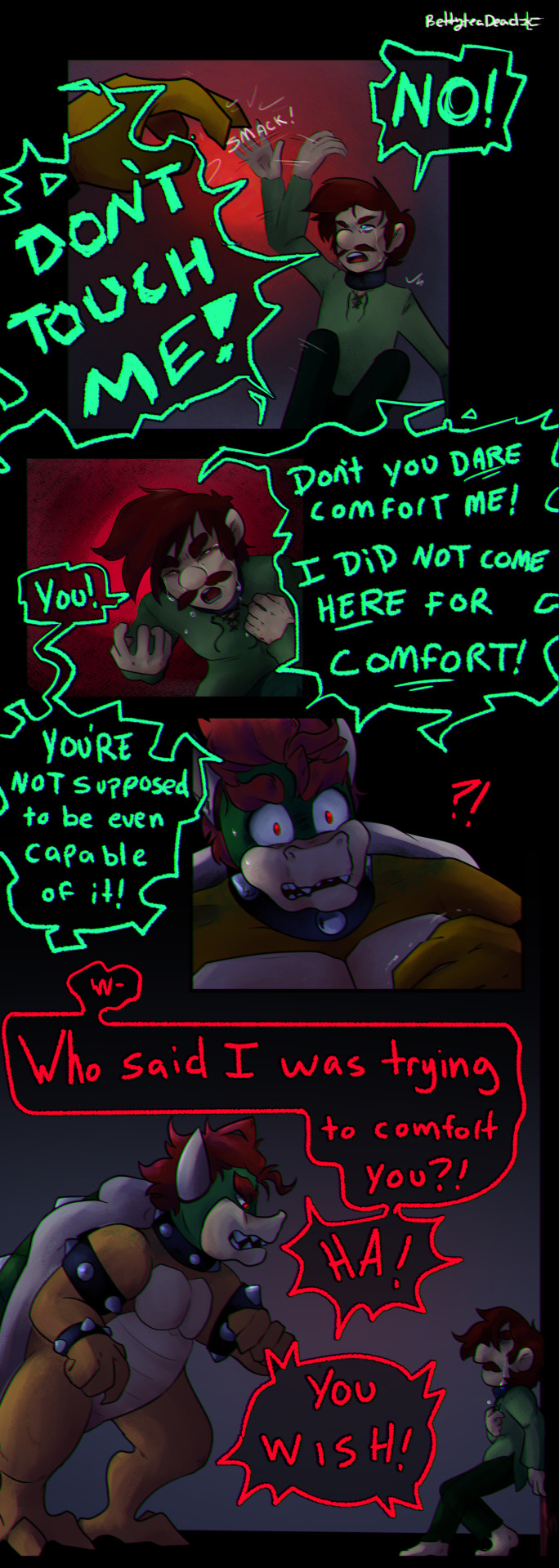
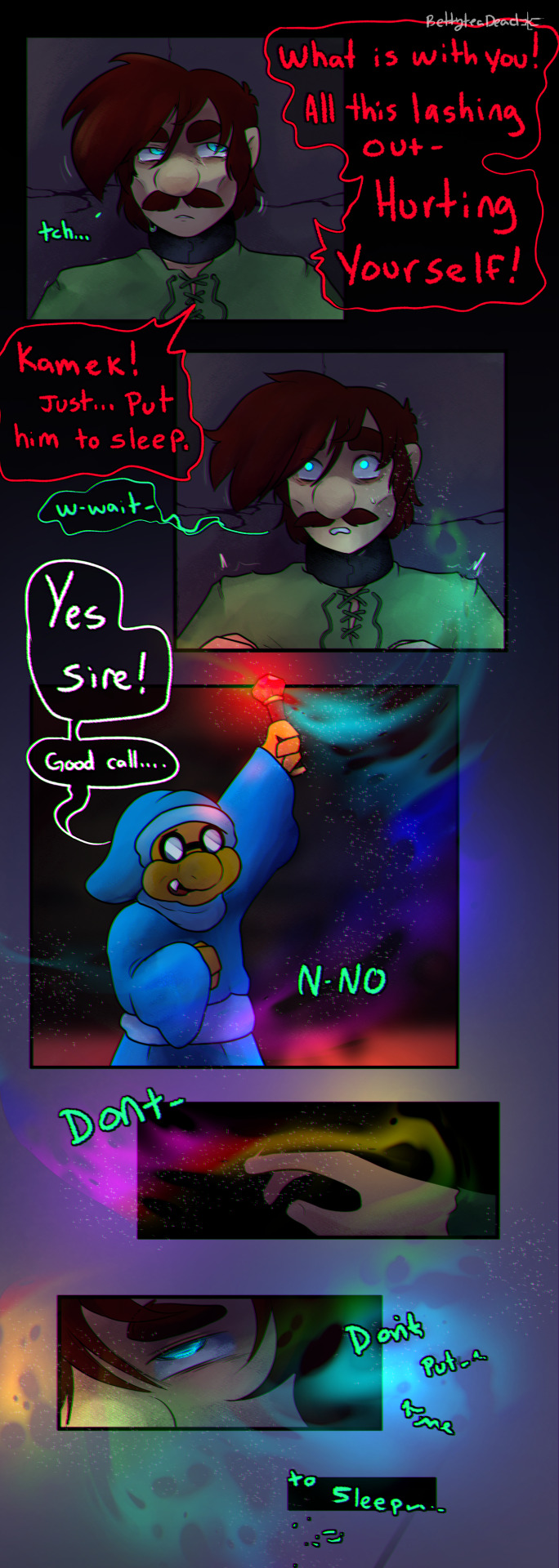
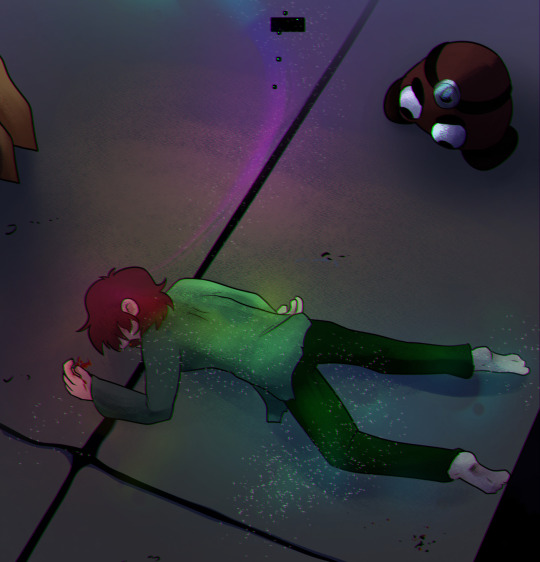
MEGA POST: Prisoner AU - Part 1
-
Page 20
-
Part 1: You're here!
Part 2: N/A
-
Click here for next page (N/A)
-
Master Post of Comics
#comic#fanart#bowser#luigi#mario#bowugi#prisoner!au#tw: violence#tw: blood#tw: starvation#tw: suicidal themes#princess pach#supermariobros#smb#super mario bros#mario bros
228 notes
·
View notes
Text
I was running away from a prison in a very large field because I killed a very annoying classmate. No one stopped me.
333 notes
·
View notes
Text
"In prison, for example, it is generally held to be a social error to talk to a guard or other official, except in an effort to obtain personal benefit (at the expense of the State) or to advance the interests of prisoners as a group. Any inmate seen talking frequently, or for any length of time, with a prison guard is likely to be suspected of treachery. Unless he has clearly established his reputation for being "right", he is sure to be called a "rat" if he persists in such conduct. There are exceptions, of course. Certain guards are known to be averse to the use of information turned in by "rats" (although such guards are as rare as the proverbial snowballs in hell). It is not deemed wrong to talk with such guards, who are considered nearly "right" themselves. Even a man with a reputation for being "right", however, so strong is intramural prejudice in this matter, generally thinks it wise, after being seen talking with a guard, to make some sort of explanation. "I was only trying to build him up for a change of jobs," he will say; and if he is a man who values his prison reputation, he will make it a point to talk openly and unconcealedly when he has occasion to talk with a guard. Any appearance of stealth is damning.
The "rats" (informers), of course, make it a point never to be seen talking with guards unless they have already become known as informers, and have therefore already lost their standing among their fellow inmates. Even when they have become generally known as "rats", however, many of them continue to be stealthy and furtive in their dealings with officials; the theory being that there are always new men coming into the prison to whom their true characters are as yet unknown. In some prisons in which I have served time, informers are pretty harshly dealt with.
In the prisons of New York, for example, the life of an informer is fraught with danger and the certainty of eventual sudden death. In Auburn Prison, in 1926, two Italians came to blows in one of the shops. Finally they drew their knives, without which most Latins never travel, even in prison, and one of the men was pretty badly wounded. Unwise to prison ways, or perhaps so eager for revenge that he lost all sense of discretion, the man who had been wounded went out to court and testified against the man who had wounded him, with the result that his opponent received an eight-year sentence for assault with a dangerous weapon. They were brought back to the prison the same day and locked into their cells until it was time for recreation. As the bell rang for yard, they left their cells and walked down the stairs and along the corridors toward the yard. The man who had turned state's evidence did not even get as far as to the yard. He was picked up in the cell block with a nine-inch knife sticking out of his heart; and the authorities never did find out who his assailant was except that it was not the man against whom he had testified, who was in a different cell block.
During my three-and-one-half years in Auburn I knew of five other cases where informers or suspected informers were thus dealt with; and in another prison I actually saw two men stabbed to death for violation of the unwritten code of the underworld.
The importance of this underworld custom is not in the fact that an informer occasionally gets killed. It is in the fact that through fear of bodily harm and possible death the inmates are as a rule kept from being on decent, normal terms with prison guards and other officials. Unless the guard is himself "right" (in other words more or less crooked), the prisoner fears to incur suspicion by being seen talking with him. Thus the average prisoner, should he feel the urge for reformation, and the desire for encouragement and support from the officials, is afraid to seek aid. After all, he is a prisoner; he has to spend most of his time among the other prisoners; and he naturally hesitates to incur ostracism at the best, and death as a likely worst, should he depart from the code generally accepted by the prison herd. This explains why it is that prison officials, even when they try to help prisoners to reform, find it so hard under present conditions to accomplish anything.
This code of conduct has another effect which bad for the morale of the prison. Prison guards are not for the most part educated and intelligent men. They sense the antagonism of the prisoners and in most cases react its natural way. That is, they too become hostile to their inmate charges. They resent the hostility of the roughneck type of prisoner and resent the intellectual superiority of the more intelligent prisoner; and thus a wall of active hatred and antagonism springs up between guards and inmates.
It goes without saying, of course, that in most prisons the admirable part of this code is more honored in the breach than in the observance. Men of high ideals, men with a personal code which is rigorously lived up to, are infinitely more scarce in prison than they are anywhere else. In the old days, when a convict or a criminal was actually a social pariah, shunned by all respectable people, he was forced into a group, the code of which he was obliged, at the risk of death, to live up to. At present, when laws in general are broken by nearly every one, the sharp dividing line between criminals and honest men has broken down, and thus the underworld code has become, like most religious codes or ethical standards, greatly undermined and weakened. There is, in other words, very little of that "honor among thieves" of which so much has been written. Thieves are, for the most part, pretty treacherous, double-dealing wretches, without a trace of glamour, and very different from the "gentleman thief", "Raffles", and other types beloved of crime-fiction writers and sentimentalists.
The average convict, as a matter of fact, however loudly he may assert his adherence to the prison code, usually deems it proper to violate it if he can do so without getting caught and if in so doing he can advance his own interests. I have known quite a number of inmates who were generally believed to be "right", who were "rats" under cover for years, and thus secured paroles and other privileges for themselves through betrayal of the pals to whom they vociferously pretended to be loyal.
The only criminal who, as a rule, can be expected to live up to the prison code is the gangster (and some few high-grade thieves). The gangster is usually a man who has grown up in a neighborhood where rigid adherence to the code was a matter of life and death, so that it is actually a religion with him to be "right." If any one questions my use of the word "religion", I refer him to John Stuart Mill, who once stated that, "Any man who lives up to a code of behavior based upon ideals which to him seem upright and fair, has a religion, however warped and misguided it may be." And any one who has had close associations with gangsters will understand why I use the term "religion" in speaking of his attitude toward the underworld code. Most gangsters, it happens, come from the slum districts of the city, usually from parents of foreign (including Irish) extraction. Most of them were brought up in the Catholic faith and have thus at an early age been impressed with the need of close adherence to a body of belief which was generally despised by the majority of the members of the community (Catholics have always been at a disadvantage in the American community, except in the urban centers).
Having spent several years in daily contact with the gangster, I have had ample opportunity for observing the way in which he lives up to his narrow code. Without for an instant wishing to glorify him, or make him glamorous (which he is not), I nevertheless have to record that he is, of all criminals, the man who most nearly lives up to a code of conduct which he believes right (from his twisted point of view). I have personally known gangsters who went to prison for long terms when, by revealing the truth, they could have shifted the blame where it rightfully belonged (on other members of the tribe who luckily evaded arrest).
When Mr. Osborne was warden of Sing Sing, there were thirty-nine executions. Mr. Osborne was on unusually close terms with the gangsters. They knew him to be trustworthy, a man of honor, whose word was his bond, never to be violated. For this reason he was able to learn (confidentially, of course) a great many things which he knew nothing about officially (as warden). In this way he knew, for example, of four gangsters who went to their deaths in the electric chair for crimes they did not commit. From the gangsters' point of view, this was merely "the breaks of the game" which they accepted bravely and philosophically. Had other gangsters happened to get caught in their places, these would also have been expected to accept their hard fate without breaking the chief tenet of their faith: "Never squeal! Death before dishonor." Such men surely had a religion and lived it. That is why I consider the gangster the most high grade of criminals.
As for statements that the gangster is merely a drug-crazed, cowardly killer, which has been made chiefly by prejudiced policemen and ignorant fictioneers, may I say this: There are, it is true, cowardly hangers-on in every group, spineless fellows who can function only as units of a gang and are personally without courage. These are not, however, true gangsters. They are merely the toadies and weaklings who have always attached themselves to the camps of the strong. The true gangster is usually anything but lacking in physical courage. I have seen gangsters stand up and fight each other with clubs, knives, side-walk bricks, or anything which happened to be handy, in rough-and-tumble fights where there were no rules except that the toughest man would survive. The gangster will fight fairly only with those he considers his equals.
The fact that in late years gangsters have taken to putting each other "on the spot", as it is called, has gained them the reputation of being cowardly killers who shoot their enemies in the back. The real gangsters do not resort to this method of killing through cowardice: it is rather a matter of caution. For the most part, gang killings are now committed by hired gunmen, who often have no other connection with the gang. With them killing is purely a matter of business, a dangerous business which must be done quickly and without involving arrest and execution. The hired killer, therefore, arranges to have his victim at a certain spot at a certain moment, when he steps in and finishes the grim business and dashes off to a prearranged place of safety and an alibi usually prepared in advance. It is not the fear of enemy bullets, but the fear of arrest and execution which makes him do the business thus callously and expeditiously."
- Victor F. Nelson, Prison Days and Nights. Second edition. With an introduction by Abraham Myerson, M.D. Garden City: Garden City Publishing Co., 1936. p. 115-121
#words from the inside#prisoner autobiography#prison community#convict code#gangsters#prison days and nights#victor nelson#history of crime and punishment#professional criminals#violence in prison#reading 2024#snitches get stitches#prison rat#american prison system#spy system#research quote
0 notes
Text

Such an important thread!
We know how Palestinian people are treated in IOF prisons is beyond criminal -the IOF are war criminals and have and continue to commit heinous and systematic crimes against humanity -this is calculative mass cruel and unusual torture and punishment:


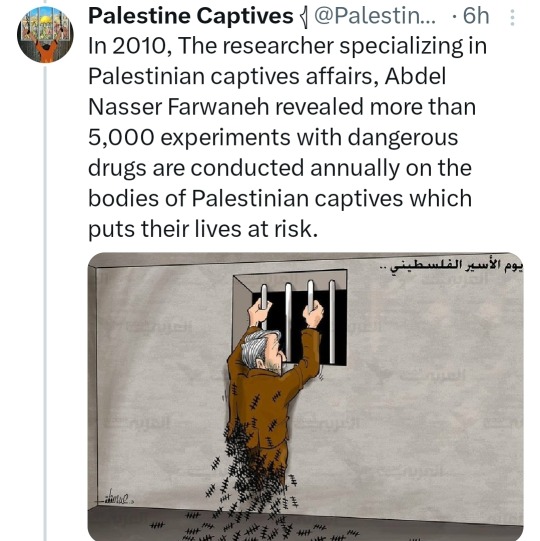

#feminist#feminism#social justice#free palestine#freepalastine🇵🇸#palestine#free gaza#settler violence#settler colonialism#colonial violence#palestinian prisoners#israeli war crimes#crimes against humanity#human rights violations#israel is a terrorist state#end the occupation#end the genocide#current events#ceasefire now#ceasefire#tw torture
3K notes
·
View notes
Text
“I tried to explain that I was a musician but it didn’t work. You say you are a musician and it irritates them so much they beat you more, and accuse you of lying,” said Merkotan

While international organizations inspect and have access to our prisons where Russian prisoners are held, they turn a blind eye and do not fight for proper conditions for Ukrainian prisoners.
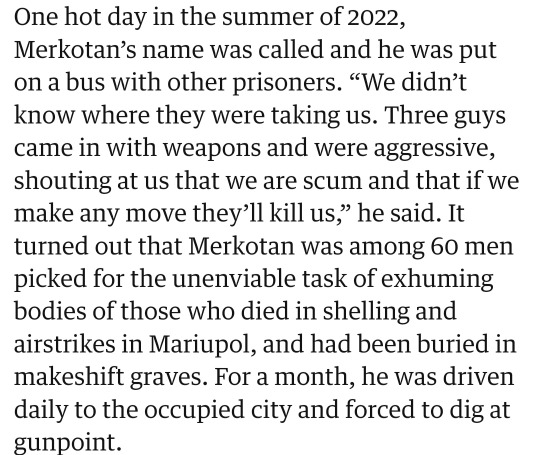
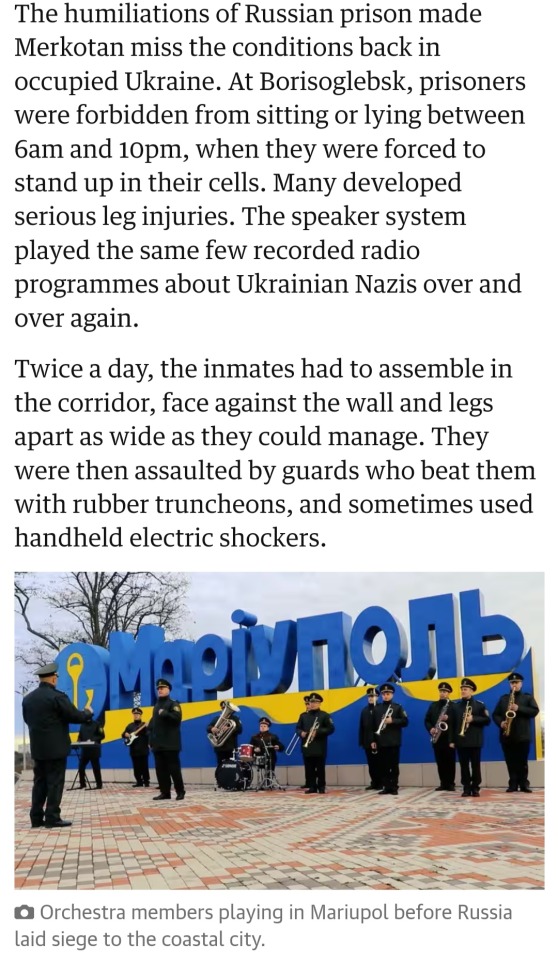
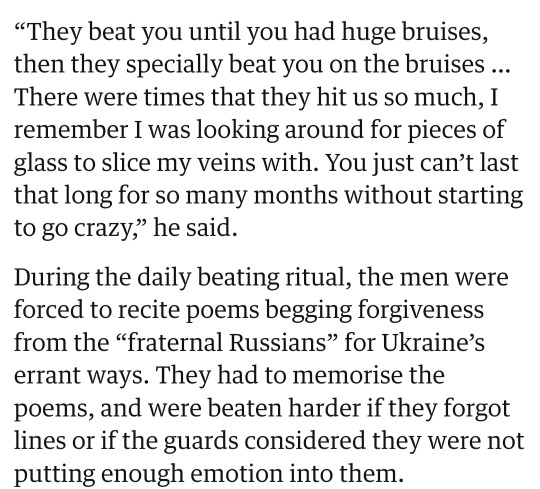

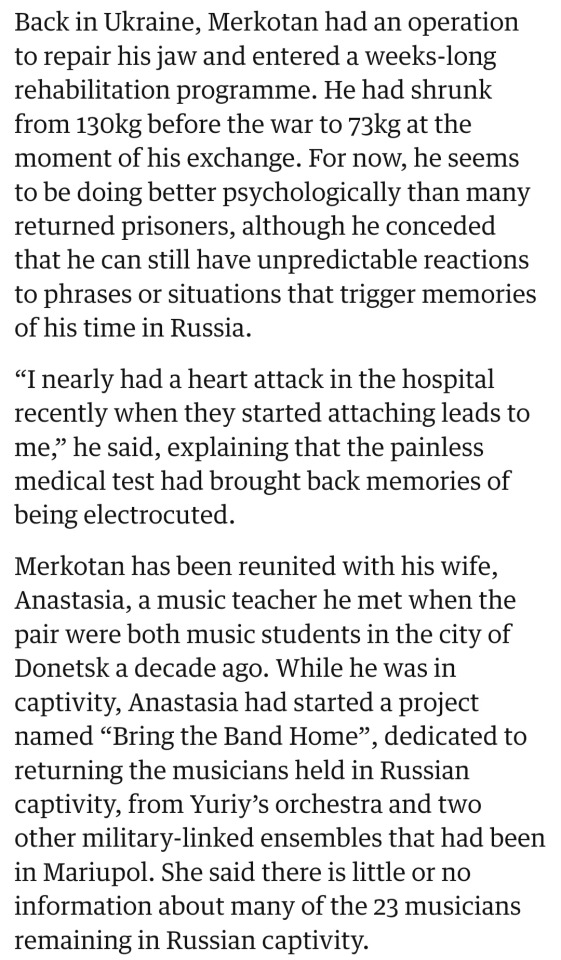
Another thing that outrages me is the way "Putin's prison" is used. It was not Putin who tortured him and others, but russians. This is not Putin's war, but Russia's. These are not the decisions and crimes of one person. After 10 years of war, the Russians are still being singled out and absolved of responsibility. That's impossible levels of stupidity and cowardice.
#ukraine#musician#music#culture#russia is a terrorist state#russo ukrainian war#russian invasion of ukraine#prisoner of war#war in ukraine#russian war crimes#war crimes#genocide#stop the genocide#free azovstal defenders#free defenders#world#united states#stand with ukraine#standwithukraine#arm ukraine#український tumblr#український тамблер#news#captivity#important#signal boost#please reblog#colonial violence#russia must burn#it's russia's putin
179 notes
·
View notes
Text

Reginald Dwayne Betts, from Felon: Poems; "Behind Yellow Tape"
[Text ID: All the stories I keep to myself tell how / violence broke & made me,]
#reginald dwayne betts#felon: poems#behind yellow yape#words#poetry#typography#prison industrial complex#there's no return from a red like that#on violence#and never told the secret that kept me apart from them#…#unsayable#the great wound
1K notes
·
View notes
Text
cw: // death mention // violence // torture //
Aw man I have an idea for a “Leo spends a lot longer in the Prison Dimension” divergence.
The way the Prison Dimension works is that it essentially keeps you alive so long as you haven’t completely broken.
Leo, despite how sure he was that he was going to die, didn’t want to, and that’s all the Prison Dimension needed to keep him “alive” and “resetting” him. His body is kept in the exact same state he was in when he entered the dimension - messed up, but mostly okay.
Also, Leonardo “jokes are how I cope” Hamato eventually uses his newfound “oh I can’t die” status as a way to relentlessly quip at Krang One. Sure, he “dies” many times doing this, but eventually he just treats it like a game. How much does he have to fuck around until he finds out?
The amount varies.
He’s thankful that his (Casey’s-) photo is still intact, though at some point he has to etch the names of the people in it (his family-) into the walls of whatever building rubble he called home.
Sometimes he and Krang One talk. It’s almost nice, at times, having another being there.
Leo doesn’t know what to think of this.
The nice feeling always ends with his “corpse”, anyway.
Leo’s eventually saved, of course, and he’s brought back home and he smiles, smiles, because of course his brothers saved him! Of course he got out! He never gave up, not really, so they didn’t either-
And then he noticed how tall they were. How Mikey had hair, how Raph’s scars had long healed, how Donnie’s tech was more advanced.
Six years, they tell him. Six years.
And Leo looks the same. Just as banged up as ever, still a mess of bruises and cuts that he’s grown so familiar with. (And it does not escape Raph’s eye how dark the ring of bruises around Leo’s neck are-)
And it’s fine! It’s fine. He just needs to play catch up, now. He’s technically six years older too, right? Only his body is sixteen. His wounds will heal, and he will grow up too.
Only that doesn’t happen.
Because here’s the thing about the Prison Dimension: it’s grown fond of Leo. Six years is nothing to it, but Leo was new, different from what normally comes through. Leo was a bright blue light that only grew brighter with time, coming back from where it was almost snuffed out. So, a piece of the Dimension attaches itself to Leo’s soul, living yet not, and he remains as he’s been for the past near decade.
His wounds do not heal. He does not grow.
He exists more than he lives. And in the back of his mind he can hear Krang One screaming.
He wonders if his own screaming was heard back.
#rottmnt#rottmnt leo#rise of the teenage mutant ninja turtles#rottmnt movie spoilers#rottmnt au#listen-#I have more to say about Prison!Leo#uncanny leo who sometimes looks at his brothers with a blank stare#he sees how his brothers developed their ninpo and is like ‘cool I wonder if I can do something more too’#and then he accidentally almost kills a guy by taking away his life force#Leo: oh! well! not doing that again!¯\_(ツ)_/¯#kdkdkdk I gotta draw for this wait-#death mention /#violence mention /#prison dimension#krang one#prison!leo au
1K notes
·
View notes
Text

"Hey speaking of having made my peace with it, you wanna go do some forced labor for our kind owners, the shareholders?"
#morning#good morning#good morning message#good morning image#good morning man#the good morning man#the entire morning#gif#gm#morning vibes#morning motivation#tgmm#☀️🧙🏼♂️✌🏼#peace#I've made my peace with it#implied violence#you gotta do what you gotta do#unicorn#unicorns#pink#pastel#jail#prison#orange is the new black#orange is the new rainbow#shiv#prisoner#prisoners
79 notes
·
View notes